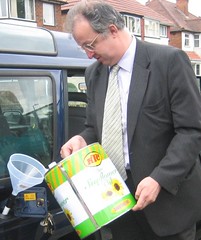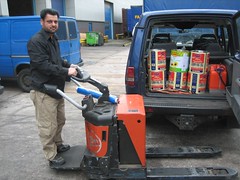
Collecting signatures at the Wheatsheaf, Sheldon for the Knife Crime Petition

Putting sustainable fuel in the tank

Getting the fuel from Wednesbury

Relaunching Sheldon Community Centre and opening the Fun Day.
I am setting up a facility for people to refuel relatively easy using pure rapeseed oil and paying the 27p duty to Mr Brown. There are no planning issue, but the Health and Safety Executive have some controls. The flashpoint for vegetable oil is about 220C so we really don't have to worry about explosions (petrol for example is -40C)
An extract from my last email from the HSE:
Flashpoint is one of the main properties used to determine the fire and
explosion hazard of a material. The flashpoint is defined as the
temperature to which a liquid must be heated before it will produce a
mixture of vapour in air which can be ignited. Lower flashpoint liquids,
particularly those with flashpoints at or below ambient temperature, need
particular care when being handled.
As examples,
The flashpoint of petrol is - 40°C
The flashpoint of methanol is 11°C
The flashpoint of diesel is at least 55°C
The flashpoint of vegetable oil will depend on the original source
material, but for rape-seed oil it is quoted as 220°C.
The flashpoint of bio-diesel again depends on the source material. It is
significantly higher than conventional diesel, and flashpoints may be
between 125 and 150°C. In use bio-diesel is usually blended with
conventional diesel, a typical ratio being 20% bio-diesel / 80%
conventional diesel. The flashpoint of this fuel will be close to that of
conventional diesel material, ie roughly 55°C.
Storage of bio-diesel and its blends does not give rise to additional areas
of concern, (in comparison to diesel), and the guidance set out in HSG176
for higher flashpoint liquids can be applied.
Comments
The second law of thermodynamics and the Carnot Cycle are the things that drive the efficiency of most heat based engines.
CCGT gas generators run at 55% efficiency. With CHP the waste heat can be "used" as well.
Diesel engines can hit an efficiency of 50%, but transmission losses will take that down.